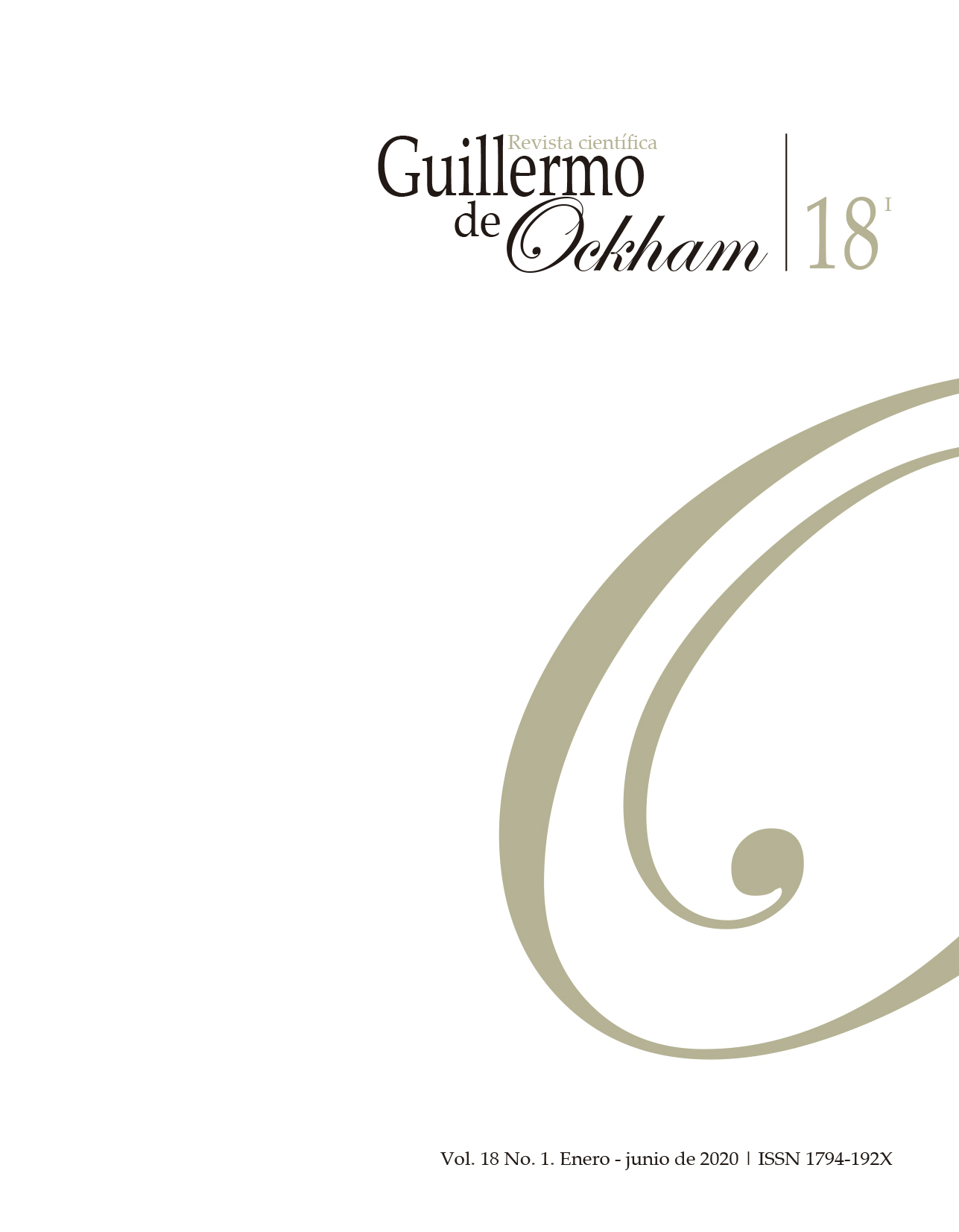The Revista Guillermo de Ockham provides an immediate and open access to its content, based on the principle of offering the public a free access to investigations to provide a global interchange of knowledge.
Unless otherwise established, the contents of this journal has a license with Creative Commons Attribution-NonCommercial-NoDerivatives 4.0 International (CC BY-NC-ND 4.0) http://creativecommons.org/licenses/by-nc-nd/4.0/
- Attribution: You must give appropriate credit, provide a link to the license, and indicate if changes were made. You may do so in any reasonable manner, but not in any way that suggests the licensor endorses you or your use.
- NonCommercial: You may not use the material for commercial purposes.
- NoDerivatives: If you remix, transform, or build upon the material, you may not distribute the modified material.
- No additional restrictions: You may not apply legal terms or technological measures that legally restrict others from doing anything the license permits.
Resumo
Este artículo presenta un análisis sobre las teorías sociológicas del envejecimiento y la vejez, incluyendo sus influencias actuales en la investigación académica y el diseño de políticas públicas. La metodología es de tipo cualitativo, de niveles relacional y explicativo. Se revisaron la teorías sociológicas del envejecimiento y la vejez utilizando técnicas de análisis documental. Se encuentra que estas teorías se han agrupado en tres generaciones, a partir de 1949, cada una con unos matices particulares. Las de primera generación se enfocan en asignarle a las personas viejas su lugar en la sociedad; las de segunda, en identificar sus formas de relacionarse; las de tercera tienen una perspectiva crítica respecto a las previas. Esta revisión de las teorías existentes revela que el campo teórico y sociopolítico relacionado con el envejecimiento y la vejez es heterogéneo y sirve como escenario de enfrentamiento entre posturas muchas veces contradictorias.
Referências
Bengston, V., Burgess , E. y Parrot, T. (1997). Theory, explanation, and a third generation of theorical development in social gerontology. Journal of Gerontology: Social Sciences, 52B(2), S72-S88.
Bengston, V., y Dowd, J. (1981). Sociological functionalism, exchange theory and life-cycle analysis. A call for more explicit theoretical bridges. International Journal of Aging and Human Development, 12(2), 55-73. doi 10.2190/L6Q5-UKJ0-YN87-FQK1
Bury, M. (1996). Envejecimiento, género y teoría sociológica. En. S Arber y J. Ginn (Eds.), Relación entre género y envejecimiento (pp. 35-54). Madrid; Narcea Ediciones.
Catunda, M. (2008). Teorias sociológicas do envelhecimento. En: A. Neri (Eds) Desenvolvimento e envelhecimento: perspectivas biológicas, psicológicas e sociológicas (pp. 73-112). Campinas, Brasil: Papirus.
Cowgill, D. y Holmes. L. (1972). Aging and modernization. New York: Appleton-Century-Crofts.
Cumming, E., & Henry, W. (1961). Growing old: the process of disengagement. New York: Basic Books. doi 10.1093/sw/7.3.122
Curcio, C. (2010). Investigación y envejecimiento: del dato a la teoría. Hacia la promoción de la salud, 15(1), 144-166
Dannefer, D. (1998). What´s in a name? An acocount of the neglect of variability in the study of aging. En Birren, J. And Bengston, V. Emergent theories of aging (pp, 306-343) New York: Springer. Obtenido de https://www.researchgate.net/publication/232504288_What%27s_in_a_name_An_account_of_the_neglect_of_variability_in_the_study_of_aging
Dulcey-Ruiz, E. (2010). Psicología social del envejecimiento y perspectiva del transcurso de la vida : consideraciones críticas. Revista Colombiana de Psicología, 19(2), 207–224.
Featherstone, M. y Hepworth, M. (1991). The Body: Social Process and Cultural Theory. Londres: Sage. doi 10.4135/9781446280546
Ginn, J. y Arber, S. (1996). “Mera conexión”. Relaciones entre género y envejecimiento. En: S. Arber y J. Ginn (Eds.), Relación entre género y envejecimiento (pp. 17-34). Madrid: Narcea.
Gómez, J., y Curcio, C. (2014). Salud del anciano: valoración. Manizales: Blaneconor.
Gubrium, J. F. (1993). Speaking of life: horizons of meaning for nursing home residents. New York: Aldine de Gruyter.
Gubrium, J. F. (1997). Living and Dying at Murray Manor. Charlottesville; VA: University of Virginia Press.
Gubrium, J. F. (2011). Narrative events and biographical construction in old age. En G. Kenyon, E. Bohlmeijer, and W. Randall (Eds.), Storying later life: issues, investigations, and interventions in narrative gerontology (pp. 39–50). New York: Oxford University Press.
Havighurst, R. J. (1961). Successful aging. Gerontologist, (1), 8-13. doi 10.1093/geront/1.1.8
Hernández, A. (2016). Envejecimiento y longevidad: fatalidad y devenir. Teorías, datos y vivencias. Bogotá: Universidad Externado de Colombia. Centro de Investigaciones sobre Dinámica Social.
Kart, C. (1997). Sociological theories of aging. The realities of aging: an introduction to gerontology. Boston: Ally & Bacon.
Moody, H. (1992). Gerontology and Critical Theory. The Gerontologist 32:294-295. doi 10.1093/geront/32.3.294
Neugarten, B. (1999). Los significados de la edad. Barcelona: Herder.
Oddone, M (2011). La teoría social del envejecimiento. Un análisis histórico. En Roberto Barca (Comp.) La gerontología a través de una historia institucional. Obtenido de: https://www.academia.edu/12284524/Centro_de_d%C3%ADa._La_gerontolog%C3%ADa_a_través_de_una_historia
Riley, M. W. (1987). On the Significance of Age in Sociology. American Sociological Review, 52(1), 1-14. doi 10.2307/2095388
Tornstam, L. (1992). The quo vadis of Gerontology: On the scientific paradigm of gerontology. The Gerontologist, 32, 318-326. doi 10.1093/geront/32.3.318































